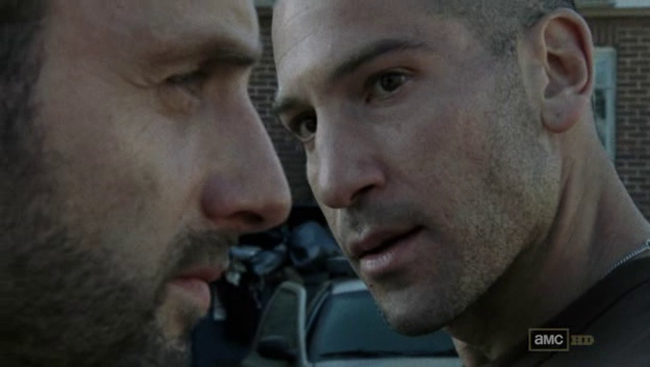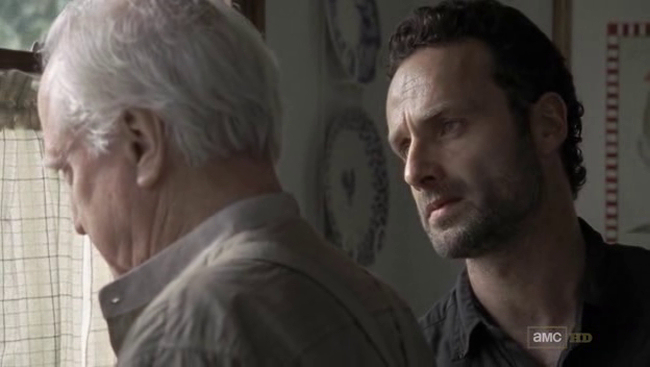
I'm three episodes into season three of The Walking Dead, almost halfway through the series, so I guess this is a good time to talk about it. Season two was a lot better than season one and I can see why the show is extraordinarily popular. It's one of the few things in U.S. media I've seen that genuinely bridges the cultural divide. Liberals can enjoy it despite the fact that it's an inherently right wing fantasy--all thanks to the zombie, something we all can agree is bad. Even that wouldn't be enough, though, if the writing wasn't good, which it really is. On the one hand it follows perfectly in the tradition of George Romero's zombie films which were always more about the moral quandaries of the human protagonists than the threat of zombies. And on the other hand, its ruminations on justice and self-determination make it the spiritual descendent of the Western. Of course, maybe these two genres were never so different as one might have supposed to begin with because this fusion feels so natural as to not truly be a fusion at all.
Spoilers ahead for the first two seasons and the beginning of season three.

The farm on which most of season two the characters live could be taken right out of a western, a desperate frontier settlement like in The Searchers or Once Upon a Time in the West where a family is trying to eke out an existence despite bandits or savage Native Americans. Like the troglodytes in the recent Bone Tomahawk, zombies provide in one sense the politically uncomplicated alternative to Apache raiding parties. On the other hand, zombies are filled with potential for moral dilemmas.

Like Gregory Peck's rancher in The Big Country, we admire Hershel's idealism, or maybe we really pity it, in his decision to define himself as a farmer who will not engage in bloodshed. Never for a moment do we think he might be right about the zombies, though.
In being the transplanted fantasy of the frontier farmer, Hershel has several of the unrealistic characteristics. For one thing, in reality single handed subsistence farming is simply impossible. Every farmer requires some amount of trade goods and there's no way Hershel could reasonably have expected to keep that farm all alone forever, particularly when he has no visible crops.
His mistake in thinking the zombies are still human seems like a gesture towards empathy but it works out only to stack the deck further against the zombie. You'll notice that despite the fact that all the characters talk about needing to find food supplies we never see them going mad with hunger or become in some way physically or mentally compromised for want of food, at least not so far as I've seen. Maybe this changes later, but at this point it feels something like another aspect of conservative fantasy--the men and women willing to work and support themselves versus the masses of impoverished who are only mouths to feed.
It also makes the right to own guns more attractive and reasonable. I was amazed how everyone seems to quickly become a crack shot in season two. The little kid, Carl, is able to shoot a zombie in the head, with one shot, while his father is between him and his target. Except for some target practice Andrea has and Carol at the beginning of season three, firing a gun almost always accomplishes precisely what the shooter wants.
In this carefully constructed fantasy setting, the characters are free to explore moral problems. In the first two seasons, this is best exhibited by Shane, played by Jon Bernthal with the unfortunate broadness of a villain half as complex as the character actually is. Of course, he's more often put in the position to make the tough decisions than other characters--deciding whether or not Rick was dead already in the hospital, deciding whether he needed to kill Ottis in order to save himself and Carl, and deciding how best to deal with Hershel's delusion regarding the humanity of the zombies.
That last one was really on everyone's plate but the series makes clear it's only Shane, the borderline psychopath, who is able to take the extreme step necessary for the good of the group. The dichotomy between he and Rick seems as though it was inspired by James Stewart and John Wayne in The Man Who Shot Liberty Valance; Rick, like Stewart's character, represents new civilisation and law while Shane, like Wayne's character, represents dirty frontier justice. It's interesting that after Rick is finally forced to kill Shane, Rick becomes a synthesis of both characters. Whereas before, every one of Rick's decisions was obviously reasonable, now he does controversial things like killing the hostile prison inmate at the beginning of season three or dissolving democracy at the end of season two. Neither decision is obviously right or wrong and the show invites you to consider it and debate it. It's really exciting that a television series is doing this, not since some of the best episodes of Star Trek have we really had something like that.
For the record, I don't think Shane did the right thing letting the zombies out of the barn. It was a waste of ammo and made too much noise. Rick or Dale ought to have at least tried telling Hershel about the CDC findings from the end of season one. It was also pretty clear Hershel was convinced after Shane shot one of the zombies twice in the gut. I do think Rick did the right thing killing the guy who was trying to kill him, though, at the beginning of season three.

No comments:
Post a Comment